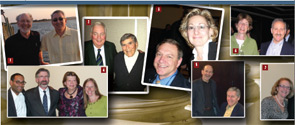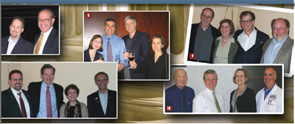The paradox is that while we are the happiest specialists, we are among the smallest of subspecialties and face severe shortages of rheumatologists in the near future. How then can we leverage these survey results and get the word out to medical schools and residency programs? How can we help the next generation catch happiness?
The good news is we have ramped up our efforts as a College in this area over the past several years. We have programs specifically designed to attract medical/graduate students and residents to our specialty. Programs include the Choose Rheumatology campaign, the Research and Education Foundation (REF) preceptorship program, and special events including the Pediatric Residency Program at the ACR/ARHP Annual Meeting.

2. L–R: Drs. Arthur Weaver and Herbert Kaplan.
3. L–R: Drs. E. William St.Clair and Audrey Uknis.
4. L–R: Drs. William Harvey, Timothy Laing, Karen Kolba, and Erin Arnold.
5. L–R: Drs. Chad Deal and Eric Schned.
6. L–R: Dr. Lenore Buckley, Dr. Robert Yood, Steven Echard, and Dr. David Borenstein.

8. L–R: Drs. Ellen Gravallese, David Wofsy, James O’Dell, and Jane Salmon.
9. L–R: Drs. Kenneth Saag, Joan Von Feldt, Charles King, and David Daikh.
10. L–R: Drs.Gerald Moore, Alan Erickson, Michelene Hearth-Holmes, and Ted Mikuls.
Through Choose Rheumatology, students and residents can connect with the College to learn more about our specialty and access unique educational resources. They can interact with fellows-in-training, faculty, and staff through the ACR’s social media outlets. Information about fellowship opportunities and REF funding is also available. Posters and flyers are in medical centers across the country, with more targeted outreach in the Washington, D.C., metro area to engage students and residents during the annual meeting this fall. For more information, please visit www.chooserheumatology.org. At this year’s annual meeting, the ACR will once again host 25 pediatric residents to introduce them to rheumatology. Now in its 11th year, this program includes Q&A sessions with pediatric fellows-in-training and program directors and has led to over 75 graduates entering pediatric rheumatology.
The REF’s preceptorship program introduces rheumatology as a career path by supporting a mentored one-on-one interaction and real-world learning experience focused on rheumatic disease. Applications are accepted year round, and the programs boast a 100% application success rate. For more information, or to apply for an award, visit the REF website at www.rheumatology.org/ref/awards/preceptorship.asp.
